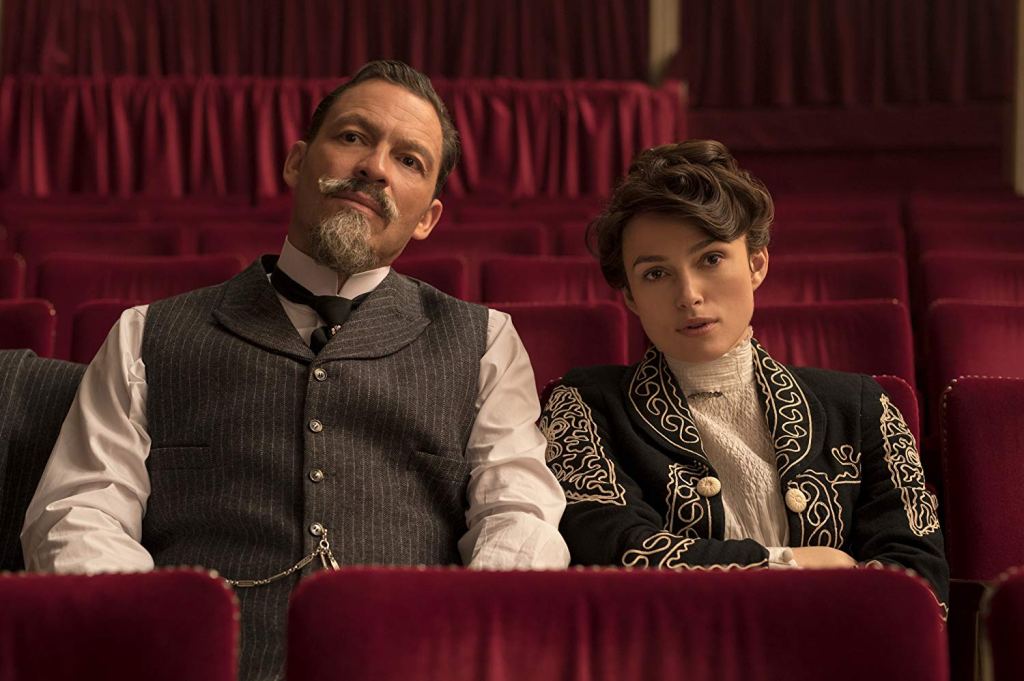‘Book-writing is hard on the brain and excruciating to the body,’ Anthony Burgess wrote in 1968. ‘It engenders tobacco addiction, an over-reliance on caffeine and dexedrine, piles, dyspepsia, chronic anxiety, sexual impotence.’
Look at Willy, to use the nom-de-plume of the Parisian rake Henry Gauthier-Villars, in Wash Westmoreland’s Colette. Willy has his name on novels, short stories and reviews. He flatulates and eructates. He smokes cigars and, this being the 1890s and dexedrine having yet to be synthesised, drinks coffee and spirits round the clock. He is constantly stressed by an energetic routine of dodging his creditors, cheating on his wife, and contriving new stories to keep the money coming in. Eventually, he’s sexually impotent too.
Willy has all the symptoms, but he’s all nom but no plume. He doesn’t actually do the writing. He outsources it to the impecunious hacks he calls his ‘slaves’, so he can get on with the real work of being famous in society and in the newspapers. His most successful ghost writer is his wife, Sidonie-Gabrielle Colette who, after shedding her forenames and her Willy, will become Colette, a big name in French letters.
Writers’ lives do not make good movies. Most of action is inside their heads, and the rest involves scribbling and typing while sitting in a chair. How to represent the leaps of imagination? When Nicole Kidman played Virginia Woolf in The Hours, she adopted the stunned expression of someone who has been hit on the head with a mallet. As Colette, Keira Knightley has an easier job. Colette was professionally vivacious, a fluent self-promoter on the page as on the stage. Knightley finds that Colette’s stories come tumbling out the moment Willy’s pen slips into her inkwell. We never see her snacking at the desk, necking stimulants in order to make a deadline, or staggering out of the lavatory while bemoaning her hemorrhoids.
Talking of which, Wash Westmoreland, Colette’s director and co-scriptwriter, got his start in the business in gay porn. How far he has come from Dr Jerkoff and Mr. Hard (‘Dr Jerkoff is a sexually starved UCLA professor who is given a secret love potion which turns him into the savage beast Mr Hard. He then proceeds to work his way through the male population of Santa Monica’). How well he has learnt from his cinematic apprenticeship in Devil Is A Bottom (‘It looks like I’ll be Mr Peanut Dick for all my life. How could Satan have lied to me?’).
When Willy (Dominic West), asked for his opinion of the Eiffel Tower, roars his approval of ‘Monsieur Eiffel’s giant erection’, you know you’re in safe hands. This is the camp Paris of Baz Luhrmann’s Moulin Rouge where, as Willy says, ‘the ideal is to be authentic but larger than life’. Colette begins as a simple country girl (pigtails down, chin up), but Willy soon turns her into an salon sophisticate (hair up, knickers down). But there is much more to Colette than sex. She is a born writer. She must be, because we never see her reading a book.
Prompted by Willy, Colette invents an alter-ego called Claudine and sexes up her reminiscences of her Sapphic convent education as Claudine at School (1900). It’s a hit, so next she sexes up her life in Paris and her and Willy’s simultaneous affairs with an American heiress as Claudine in Paris, Claudine Married, and Claudine Goes Away.
The books are so successful that young women are dressing in Claudine-style convent dresses, and buying Claudine-branded soap, cigarettes, scent, lingerie and candy. Willy keeps her working by locking her in a room of her own. He keeps all the money, too, and eventually sells the rights without telling her. He calls himself a ‘literary entrepreneur’, but he is a literary pimp.
By 1903, Colette is dressing as a man, and Claudine has taken to the stage. Willy is having an affair with a younger Claudine impersonator, and can only get it up with Colette if she wears the Claudine dress. Colette and Missy cause a riot when they kiss each other on stage while performing an inadvertently hilarious Egyptian cabaret. Colette leaves Willy, takes to the road with Missy in a cabaret revue. In 1910, she declares her independence, and also her ownership of the Colette franchise, with a showbiz memoir-novel called Vagabond.
‘I am the real Claudine,’ she tells a shrunken Willy. The problem is, we never quite understand who the real Colette was, because we never learn what made her a major female writer, rather than a titillating curio in the history of celebrity or sexual liberation. And though the script declares Colette’s autonomy — we end on a hackneyed scene with our diva in the dressing room, preparing to be absorbed in her legend — Knightley plays second fiddle throughout to West who, sporting a strap-on belly, a Mephistophelean beard, and a joie de vivreas contagious as the clap, steals the show.
Colette has what we might call a Dr Jerkoff and Mr Hard quality. This is not Colette’s fault: the biopic replicates the critical confusion about Colette the writer. When Colette and Missy kissed on stage, it was brave and emancipatory. When Madonna and Britney did it, it was crass and commercial. Was Colette a self-made writer of genius in fearless pursuit of honesty about sex? Or was she a talented but shallow crowd-pleaser, a collaborator with powerful men who, in the era of global celebrity that began with Sarah Bernhardt and Oscar Wilde, worked out how to franchise her sex life, and was prepared to do anything to stay famous? And what should we make of Colette’s anti-Semitic novel of 1941, Julie de Carneilhan which, written when France was under Nazi occupation and anti-Semitism was très chic, places Colette right up there with Jean Cocteau in the collaborators’ hall of shame?
As Virginia Woolf says in The Hours when she gets an idea for a story, ‘Leonard, I think I may have a first sentence.’
Dominic Green is Life & Arts Editor of Spectator USA.


















